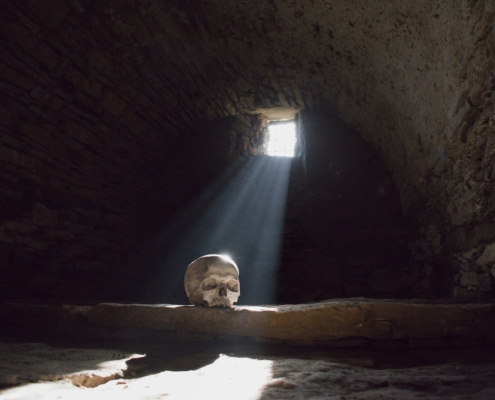Ep.1113: Paul or Matthias: Who Was the Real 12th Apostle? Contradictions Series
Clear evidence to prove Paul or Matthias as the 12th Apostle
If you do not have a password, please subscribe to our FREE Premium Content for the Full Edition version of CQ Rewind. The welcome message will contain your password, and a reminder will be sent each week when the CQ Rewind is available online for you to read, print, or download.
CHAPTERS
Theme Scripture: Acts 1:21-22
For every Christian, Jesus is THE example, leader and fulfiller of our faith. We continually gain inspiration from his perfect example and unselfish sacrifice. When we think about a less-than-perfect Christian example, most of us go to the Apostle Peter or the Apostle Paul. Both men showed us how to achieve spiritual victory through imperfection. They both had failures, regrets and doubts, and yet they were faithful. These challenges endear them to our hearts. They give us courage to work through our own imperfect experiences. Knowing this, it can be hard to believe there are many who see the Apostle Paul as an interloper, one who hijacked the gospel message. These accusations begin with disregarding the authenticity of his apostleship. They say Matthias, as a replacement for the traitor Judas, was appointed as the 12th Apostle long before Paul’s conversion.
The "pro-Matthias" argument is worth respectfully considering. After all, it is true there is no written record of either God or Jesus confirming Paul's apostleship. We only have Paul himself saying he is an apostle along with a claim by his friend Luke in the book of Acts. To be fair, there is no written record of either God or Jesus confirming Matthias' apostleship, either. But Acts 1:26 says Matthias "was added to the eleven apostles." With a plain biblical statement like that, why look further?
Wait!
Well, because there is a lot more to find once we look closer at the context. Jesus was very specific in his instructions given before his crucifixion and right before his ascension: they were to WAIT. Just wait. Don't make any decisions, don't run away, just wait. Pentecost was only ten days away. Once they received God's influence and power, the holy spirit, it would guide them into knowing what to do next. It would give them the power to do miraculous things in order to advance Christianity around the world.
Casting lots
Instead of waiting, Peter met with about 120 disciples to pray and elect a replacement for Judas, even though it was not necessary or required to be done at this time. Two candidates were proposed and the group "cast lots," an Old Testament method of determining God's will. (The option of "neither" candidate was not proposed.) Later on the road to Damascus, our resurrected Lord Jesus dramatically and emphatically appointed Saul as a "chosen vessel." Just like the other 11 Jesus-appointed apostles, Paul was called a "witness."
Check out our podcast, "Paul or Matthias. Who Was the Real 12th Apostle?" that aired live on February 17, 2020. We reviewed the points of debate for and against the Apostle Paul as being the authorized 12th Apostle of Christ. The evidence overwhelmingly showed us his rightful place. Our faith was strengthened by looking into these important details of the early church. What do you think of our conclusions?






















This podcast brings me back to studies of the scriptures! Thanks!
Hi, Joseph – we appreciate your kind comment. We are so blessed to be able to spend this kind of time studying the Bible and sharing it with our listeners. If you have suggestions for future topics you would like to hear about, please let us know. – Christian Questions
Are there people today who occupy the office of Apostle? …as in Bethel teaching
We do not understand charismatic teachings to be scriptural. See “Should Christians perform healings?” and “Is speaking in tongues evidence of receiving the holy spirit?”
Jesus “called his disciples to him and chose twelve of them, whom he also designated apostles.” (Luke 6:13, NIV)
The English word apostle comes from the Greek apostolos, meaning “one sent forth.” Jesus chose twelve who would carefully study his character, his teachings, his way of relating to others. They were always closest to him either as individuals or as a group. They witnessed his works as well as his betrayal, death, resurrection and ascension. Our Lord prepared these apostles for the purpose of being special teachers of the gospel message.
When Judas failed and vacated his station, “so that Scripture would be fulfilled” (John 17:12), the remaining eleven knew there would have to be a replacement. They hurriedly asked God to overrule when they cast lots to choose one. But though “the lot fell to Matthias” (Acts 1:26), his name is never mentioned again in God’s word. We see that the Lord had another person in mind. As he said to Ananias, “This man [Paul] is my chosen instrument to carry my name before the Gentiles…and before the people of Israel.” (Acts 9:15) That there are only “twelve apostles of the Lamb” is confirmed in Revelation 21:14.
However, Barnabas was called an apostle in Acts 14:14, “But when the apostles Barnabas and Paul heard…” In this scripture, Barnabas was not designated an apostle of the Lamb, but he was an apostle or “one sent forth” from the church in Jerusalem (Acts 11:22). As discussed in this Episode 1113, 24 individuals are called “apostles” in the Bible, but there were only 12 “Apostles of the Lamb.”
Others may be sent forth from different churches as an “apostle,” but they are not Apostles of the Lamb.
There are many offices of service in the body of Christ. Ephesians 4:11,12, “It was he who gave some to be apostles, some to be prophets, some to be evangelists, and some to be pastors and teachers, to prepare God’s people for works of service…” (Ephesians 4:11,12) – Christian Questions
Apostle Paul was co opted by God Himself to be a witness and an Apostle of Jesus Christ by Divine arrangement while Matthias was appointed an Apostle by human intervention backed by the Holy Spirit to replace Judas Iscariot.
I agree completely.
Whereas casting lots was allowed in the OT, in the NT we are to be led by Spirit and not by lots. Furthermore, rushing to appoint a replacement instead of Judas by FORCING God to give them a choice of the ONLY TWO candidatez is NOT a way to get answers from God.
As a matter of fact after I become a Christian almost 50 years ago, in the beginning of my walk with the Lord, I ended up being “fleeced” a few times as I tried to get guidance by putting out “fleeces”. That cured me for good.
One more thing, if that’s the way we are led, (lots, etc) then the the leading is not by faith, rather by sight. Of course, there is a little more to it to bring balance on the subject, but that would take too much time for the space here. John 14:26
Jesus told the 12 that they would sit on 12 thrones, judging the 12 tribes of Israel. We know from scripture that Matthias was present when Christ said those words. Paul was not. Unless you believe Judas is going to sit on one of those thrones in the resurrection, then the 12th Apostle must have there, even though he hadn’t yet been named as one. Otherwise, Christ knowingly and deliberately lied to them. Is that your position?
Obviously, we are not proposing that our Lord and Master lied. Sarcasm aside, we hope you have had an opportunity to listen to this episode. We examined many “pro Matthias” points with “pro Paul” points in order to reach our conclusion.
The passage in question:
Matthew 19:27-28: Then Peter said to him, “Behold, we have left everything and followed you; what then will there be for us?” And Jesus said to them, “Truly I say to you, that you who have followed me, in the regeneration when the Son of Man will sit on his glorious throne, you also shall sit upon twelve thrones, judging the twelve tribes of Israel.
We aren’t told that Matthias was in the audience, as the only mention of him is in Acts 1:23,26.There in Acts, ahead of Pentecost, the eleven apostles decided that another apostle should be appointed to take the place of Judas. They came to this determination by reading Psalm 109:8. “Let his [Judas’] days be few; and let another take his office.”
Based on this determination, the apostles chose to select a replacement for Judas. In their minds, it was essential that whoever was selected should meet the qualifications described in Acts 1:21,22. The individual should have companied with them during Jesus’ ministry from the time of John the Baptist to Jesus’ resurrection and was an eyewitness with them. These were certainly reasonable requirements and may indicate that Matthias and Barsabas had been followers of Jesus for as long as the other apostles. Although the requirements determined by the eleven may seem reasonable, they were not given those specific instructions by God and the choice was made amongst themselves prior to the holy spirit being given and in spite of them being told specifically to wait.
“The twelve” was a comprehensive title Jesus gave exclusively to the apostles. After Judas died and Jesus was risen, the title of “the twelve” was used when there were only 11. For example: John 20:24-25 (NASB) But Thomas, one of the twelve, called Didymus, was not with them when Jesus came. So the other disciples were saying to him, “We have seen the Lord!” But he said to them, “Unless I see in his hands the imprint of the nails and put my finger into the place of the nails, and put my hand into his side, I will not believe.”
Jesus is not limiting his comments only to those he is physically talking to, but rather, all of his faithful followers down through the ages. Peter asked about “us,” meaning the twelve. Jesus answered that those who have followed him – not speaking about that moment but about the sum total of their lives – will, in the regeneration sit with him. They will be proven and then rewarded.
Using the reasoning that Matthias had to be there would put a precedent upon Jesus’ words, that he was only speaking to those with him when he taught. In fact, Jesus often spoke to those with him in the moment as well as those who would come later. For example: John 13:33-35 (NASB) “Little children, I am with you a little while longer. You will seek me; and as I said to the Jews, now I also say to you, ‘Where I am going, you cannot come.’ “A new commandment I give to you, that you love one another, even as I have loved you, that you also love one another. “By this all men will know that you are my disciples, if you have love for one another.” We wouldn’t say that “loving one another” was just for the apostles at that time.
Jesus specifically told the apostles that God’s spirit – His power and influence – would guide them in his absence: John 14:25-26: (NASB) “These things I have spoken to you while abiding with you. “But the helper, the holy spirit, whom the Father will send in my name, he will teach you all things, and bring to your remembrance all that I said to you.”
The spirit was in many ways a replacement for Jesus. He took great pains to explain that he WAS their guide and that the spirit would serve as a guide and a reminder of his words when he was gone.
John 16:12-13 (The Concordant Bible) 12 “Still much have I to say to you, but you are not able to bear it at present. 13 Yet whenever that may be coming – the spirit of truth – it will be guiding you into all the truth, for it will not be speaking from itself, but whatsoever it should be hearing will it be speaking, and of what is coming will it be informing you.” This is important – Jesus explicitly says that when the spirit comes the guidance will start! These were among Jesus’ most important last words of encouragement to them before he was crucified.
After his resurrection and before his ascension he specifically told the Apostles to WAIT in Jerusalem:
Acts 1:4-9 (KJV) And, being assembled together with them, commanded them that they should not depart from Jerusalem, but wait for the promise of the Father, which, saith he, ye have heard of me. For John truly baptized with water; but ye shall be baptized with the Holy Spirit not many days hence.” This is an important connection. John baptized with water, and Jesus’ own ministry did NOT start until that was accomplished. Similarly, the ministries of the apostles would NOT begin until their holy spirit baptism.
• With good intention despite being told specifically told to wait, the 11 (led by Peter) decided without the holy spirit to choose a replacement for Judas. They made a human decision by using the Jewish tradition in the Old Testament of casting lots, because they did not yet have the discernment of the holy spirit to guide them. Jesus was not involved in the decision.
• In all cases, Jesus himself chose his apostles (Luke 6:12-13 and Acts 26:14-18). The 11 chose Matthias during the time between the ascension and Pentecost, when they were told to wait. – Christian Questions